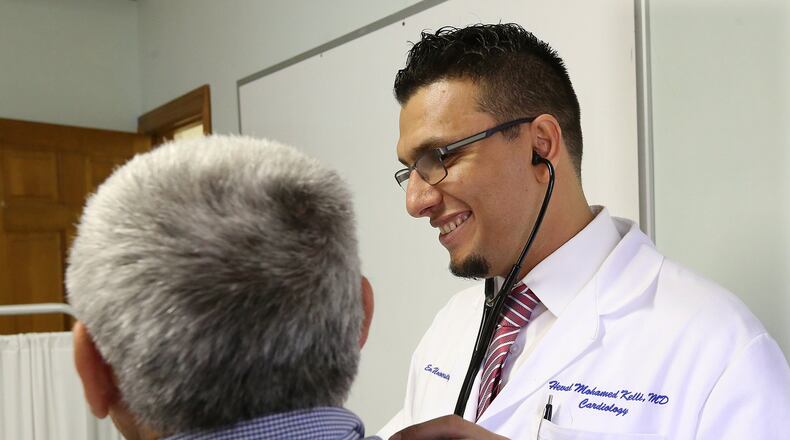Dr. Heval Kelli has treated all sorts of patients while studying in Atlanta to become a physician: Young and old. Rich and poor. Black and white. Civilians and U.S. military veterans.
Unlike most of his patients, the Morehouse School of Medicine graduate was not born in the United States. He and his Kurdish family came to the U.S. as refugees in 2001, fleeing persecution in Syria and settling first in Clarkston and then in Gwinnett County. Kelli started out washing dishes at a local Mediterranean restaurant to support his family. Now he is working just a short distance away as a cardiology fellow at Emory University School of Medicine.
Kelli is among an estimated 7,000 doctors in the U.S. - more than 200 of them in Georgia - who came from the six Muslim-majority countries targeted by President Donald Trump's travel ban. That ban is now on hold in federal courts. Together, according to researchers at Harvard University and the Massachusetts Institute of Technology, those physicians provide an estimated 14 million appointments each year for patients. And many of those patients live in medically underserved rural areas that voted overwhelmingly for Trump.
TRAVEL BAN: Revised Trump travel ban on hold
LIVING IN FEAR: Anxiety grips immigrants in Georgia
The Trump administration is appealing one of the federal courts’ decisions to temporarily halt the travel ban. Critics, meanwhile, worry that if the stay is lifted, the executive order could stem the flow of foreign medical students and doctors to the United States.
“There is already a shortage of doctors in America,” said Kelli, who has treated patients at Emory’s hospitals, the Atlanta VA Medical Center, Grady Memorial Hospital and the Clarkston Community Health Center. “If you are preventing them from coming here to become doctors, you are hurting the healthcare system.”
The ban seeks to bar visitors from some six predominantly Muslim countries for 90 days while the government bolsters its security screening process: Iran, Libya, Somalia, Sudan, Syria and Yemen. Trump administration officials pointed to exemptions in the directive for people with green cards and visas. They also highlighted their power to grant case-by-case waivers to certain travelers, though the executive order does not specifically mention doctors.
Saying the nation's security is at stake, Trump reacted furiously to the decision by a federal judge in Hawaii to freeze his travel ban.
“We are going to fight this terrible ruling,” he said at a rally in Nashville last week, a day before a different federal judge in Maryland put a key part of his order on hold.
Trump also called his directive a "watered down version" of the first one he signed in January. That directive sowed widespread confusion among travelers, triggered lawsuits and prompted large demonstrations.
As they watched those demonstrations play out across the nation, a group of graduate economics students at MIT and Harvard — some of whom are immigrants or have parents from abroad — wondered what they could do. Together, they created a website showing where the 7,000 foreign doctors are seeing patients across the United Streets. Their data comes from Doximity, an online networking site for doctors that pulls information from a variety of sources, including state licensing boards, medical schools and hospitals. They classified doctors as immigrants from one of the six nations covered by the travel ban based on where they went to medical school. One of their key findings: one out of every 100 physicians in America comes from the six nations in the travel ban.
“Our project is about looking at the clear costs imposed by the ban,” said Otis Reid, an MIT graduate economics student who participated in the study. “One doctor in a small town can be the difference between life and death for people in that area.”
Between 50 and 70 of these foreign doctors are working in the Atlanta area, providing an estimated 100,000 to 150,000 appointments for patients each year, according to the research by Reid and his colleagues.
Higher concentrations of them are caring for people in more rural regions of the state, including in the Blue Ridge and Rome areas. Both cities are in counties Trump won by huge margins. In all, there are 216 doctors from the six countries working in Georgia, according to the Medicus Firm, a national physician search firm.
Many foreign doctors are serving in areas of the country afflicted with doctor shortages. Georgia, for example, would need 370 more primary care physicians to shed its federal designation as a Health Professional Shortage Area, according to the Kaiser Family Foundation, a nonprofit that focuses in national healthcare issues.
“It is very important that we can continue to have an inflow of physicians. There is a need there,” said Dr. Manoj Shah, an Indian native and former president of the Medical Association of Georgia who now works as an obstetrician-gynecologist in the Warner Robins area.
Shah is also worried the travel ban could prevent foreign students from obtaining visas to come to the U.S. There are 1,375 foreign students enrolled in U.S. medical schools now, including 15 in Georgia, according to the Association of American Medical Colleges. Dr. Atul Grover, the association’s executive vice president, is particularly concerned whether potential medical students are hearing news about the travel ban and considering going elsewhere.
“We have the privilege of being able to choose the very best talent in science and medicine and other fields of academics that the rest of the world can’t choose from,” he said. “I don’t know if that changes — that would really hurt us.”
Ira Mehlman, a spokesman for the Federation for American Immigration Reform, a Washington-based organization that supports reducing immigration levels, pointed out the travel ban is temporary and dismissed concerns about how it could impact the nation’s supply of doctors.
“I doubt there is a shortage of people in this country who would like to go to medical school. It is still a good, high-paying profession,” he said. “The bottom line is that even if this were a permanent ban – which it is not – the vacuum would be easily filled either domestically or from other countries.”
If allowed to go into effect, the travel ban would also suspend all refugee resettlements in the U.S. for 120 days. Kelli and his family fled to the U.S. as refugees after the Syrian authorities beat him and his parents and jailed his father, an attorney who refused to work for the Syrian government. They hired a smuggler to get them out of the country and eventually landed in a refugee camp in Germany. That is where Kelli said he got interested in medicine while observing a doctor take care of a cancer-stricken friend, a Kurdish refugee who eventually died from leukemia.
“He was this German doctor,” said Kelli, a Clarkston High School graduate whose first name Heval means friend in Kurdish. “He didn’t look like them. But when he walked in the room, he made this Kurdish family so comfortable. And I realized there is so much power in medicine — that even if you do not look like someone, you can come in a room and make them feel better.”
Kelli is not alone in his family. His younger brother, Dr. Mohamed Kelli, is working as a surgical resident at East Tennessee State University. A Pace Academy graduate, Mohamed is seeing patients at hospitals in Johnson City and Kingsport, Tenn.
Among the patients Heval has treated at the Atlanta VA Medical Center is Garrett Cathcart, a West Point graduate, U.S. Army veteran and three-time recipient of the Bronze Star for combat leadership in Iraq and Afghanistan. Cathcart was impressed by Heval’s attentiveness as he was treating him for kidney stones.
“When you are in physical pain or someone that you love is hurting or sick, you don’t really care where the doctor is from. You just want them to be good at their jobs,” Cathcart said. “What struck me deeply is Heval is clearly very good at his job, but also he cared. You can’t fake caring. You can’t fake being genuinely and authentically engaged and caring about the patient you are dealing with.”
About the Author
Keep Reading
The Latest
Featured




